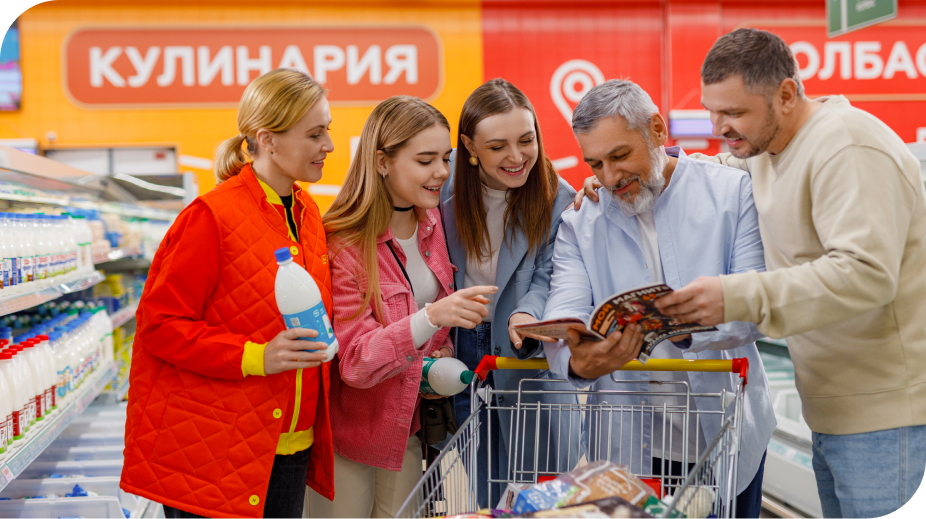2022 performance
Magnit was able to quickly adjust to the new market environment without compromising the resilience of its supplies. We transformed part of our international logistics chains, started focusing on multimodal shipments, improved the efficiency of in-house distribution, excelled in import substitution for goods that were no longer imported into Russia, and maximised the utilisation of in-house manufacturing capacity. Together these efforts saw us continue to provide our customers with quality and affordable products seamlessly every day.
Magnit’s Sustainability Strategy 2025 sets out five key areas:
Enviromental stewardship
Sustainable sourcing
Employees
Communities
Health and well-being

| UN SDG and its targets | Why do we prioritise it? | Our strategic goals | ||
|---|---|---|---|---|
| SDG 2: Zero Hunger
| Magnit is one of the largest retail chains that supplies goods and groceries across Russia. We do our utmost to offer our customers affordable and quality foods. We are the only retailer with our own production facilities, including in agriculture. We seek to maintain high quality standards, while also developing initiatives to increase the affordability of our own and third-party products for all Russians. We contribute to the creation of sustainable food production systems and provide tangible support to food and processed food markets. We ensure timely access to information about our food reserves in our regions of operation and take all possible steps to curb excessive food price volatility, particularly for socially important product categories. Additionally, we implement agricultural practices that increase yields while preserving ecosystems. | Sustainable sourcing
Health and well-being
| ||
| SDG 3: Good Health and Well-being
| As one of Russia’s largest retailers, we have a unique opportunity to promote healthy eating throughout the nation. In our Sustainability Strategy, we have set the goal of raising awareness of healthy lifestyles and supplying healthy foods. We are actively working towards this goal, with some good progress already achieved. | Health and well-being
| ||
| SDG 6: Clean Water and Sanitation
| As one of Russia’s largest retailers with our own production assets, we consume a lot of water to ensure quality and effective operations. Aware of the vital need for properly managed water resources throughout the entire value chain, we run several initiatives to cut water consumption and apply higher treatment standards. | Environmental stewardship
| ||
| SDG 7: Affordable and Clean Energy
| Having studied our key GHG emission sources, we singled out indirect emissions from energy sources as the main contributors to our environmental footprint. We intend to save energy and develop energy efficiency projects to consume less and minimise our carbon footprint. | Environmental stewardship
| ||
| SDG 8: Decent Work and Economic Growth
| We are responsible for a lot of employees. Our business keeps growing, which creates more jobs. We take responsibility for providing decent and safe working conditions along with opportunities for training and professional development. | Employees
| ||
| SDG 12: Responsible Consumption and Production
| We seek to introduce sustainability principles along our entire value chain. Aware of our environmental footprint, we are working hard to reduce it. Packaging and waste are our key focus areas. We also strive to build a sustainable supply chain by introducing supplier assessment tools and continuously monitoring best practices and their applicability to our business processes. | Environmental stewardship
Sustainable sourcing
| ||
| SDG 13: Climate Action
| Confronting the climate crisis is pivotal for all industries across the globe. We understand the importance of monitoring climate risks and their impact on our strategy. To that effect, we have taken several steps to reduce our impact on the climate in terms of both direct and indirect GHG emissions. | Environmental stewardship
| ||
| SDG 17: Partnership for Sustainable Development
| As one of Russia’s largest retailers, we have a lot of business partners, including large international companies. By joining forces we boost our contribution to the above SDGs and implement important social and environmental projects. | Communities
Sustainable sourcing
| ||